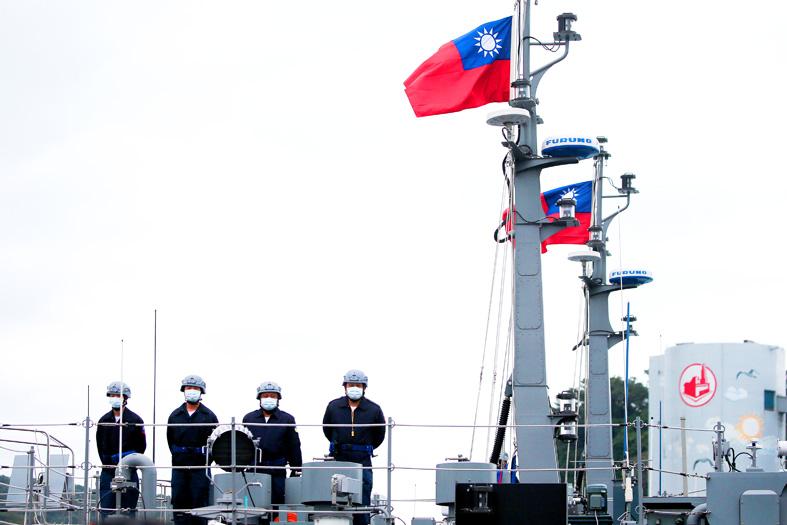Some members of President Tsai Ing-wen’s (蔡英文) administration feel that now is the time to discuss extending mandatory military service, following Russia’s invasion of Ukraine, a source said yesterday.
Politicians of both major parties in the past avoided the issue of extending mandatory military service out of fear of losing the support of younger voters, the official said on condition of anonymity.
Some are calling for the issue to be discussed now, because of the uncertainty sparked by the Russia-Ukraine conflict, the official added.

Photo: Bloomberg
Asked recently about the issue, Minister of the Interior Hsu Kuo-yung (徐國勇) said that although lengthening the military service period is not solely his decision, he agreed with an extension in theory.
“If it would benefit the safe and sustainable development of our country, then several months or a year more shouldn’t be a problem,” Hsu said.
“Two issues would need to be discussed before the service length is extended,” the official said yesterday. “First, how many troops Taiwan needs and how much the defense budget needs to be increased, and second, if the service length is extended, how would that affect the supply of labor for industry?”
The service length that would likely benefit the military the most while affecting industry the least would be between nine months and one year, the official said.
Presidential Office spokesman Xavier Chang (張惇涵) on Friday said that the issue is being discussed by the administration, but that the current focus is on bolstering the reserve force, and “integrating reserves and active-duty personnel into a single system.”
The aim is to ensure that Taiwan could call up a sufficient number of well-trained personnel if the need suddenly arises, he said.
Whether mandatory service should be extended, and by how much, would depend on training capacity, as well as how much it would benefit Taiwan’s asymmetrical combat capability, he added.

A preclearance service to facilitate entry for people traveling to select airports in Japan would be available from Thursday next week to Feb. 25 at Taiwan Taoyuan International Airport, Taoyuan International Airport Corp (TIAC) said on Tuesday. The service was first made available to Taiwanese travelers throughout the winter vacation of 2024 and during the Lunar New Year holiday. In addition to flights to the Japanese cities of Hakodate, Asahikawa, Akita, Sendai, Niigata, Okayama, Takamatsu, Kumamoto and Kagoshima, the service would be available to travelers to Kobe and Oita. The service can be accessed by passengers of 15 flight routes operated by

GIVE AND TAKE: Blood demand continues to rise each year, while fewer young donors are available due to the nation’s falling birthrate, a doctor said Blood donors can redeem points earned from donations to obtain limited edition Formosan black bear travel mugs, the Kaohsiung Blood Center said yesterday, as it announced a goal of stocking 20,000 units of blood prior to the Lunar New Year. The last month of the lunar year is National Blood Donation Month, when local centers seek to stockpile blood for use during the Lunar New Year holiday. The blood demand in southern Taiwan — including Tainan and Kaohsiung, as well as Chiayi, Pingtung, Penghu and Taitung counties — is about 2,000 units per day, the center said. The donation campaign aims to boost

ENHANCING EFFICIENCY: The apron can accommodate 16 airplanes overnight at Taoyuan airport while work on the third runway continues, the transport minister said A new temporary overnight parking apron at Taiwan Taoyuan International Airport is to start operating on Friday next week to boost operational efficiency while the third runway is being constructed, the Ministry of Transportation and Communications said yesterday. The apron — one of the crucial projects in the construction of the third runway — can accommodate 16 aircraft overnight at the nation’s largest international airport, Minister of Transportation and Communications Chen Shih-kai (陳世凱) told reporters while inspecting the new facility yesterday morning. Aside from providing the airport operator with greater flexibility in aircraft parking during the third runway construction,

American climber Alex Honnold is to attempt a free climb of Taipei 101 today at 9am, with traffic closures around the skyscraper. To accommodate the climb attempt and filming, the Taipei Department of Transportation said traffic controls would be enforced around the Taipei 101 area. If weather conditions delay the climb, the restrictions would be pushed back to tomorrow. Traffic controls would be in place today from 7am to 11am around the Taipei 101 area, the department said. Songzhi Road would be fully closed in both directions between Songlian Road and Xinyi Road Sec 5, it said, adding that bidirectional traffic controls would